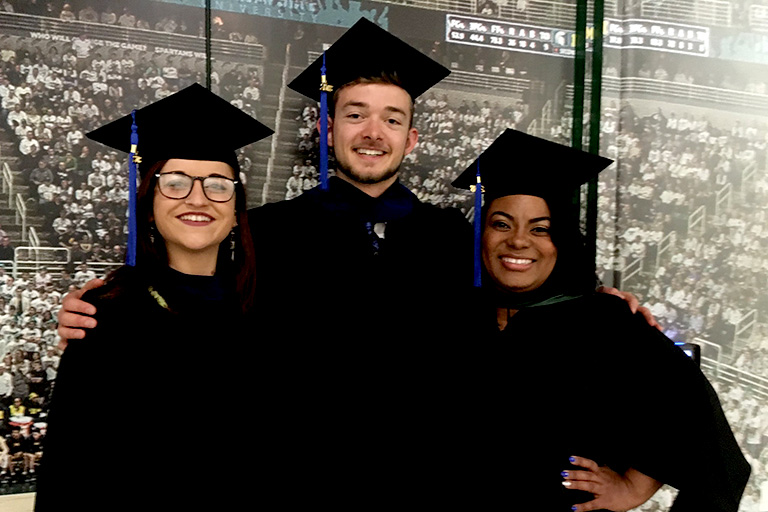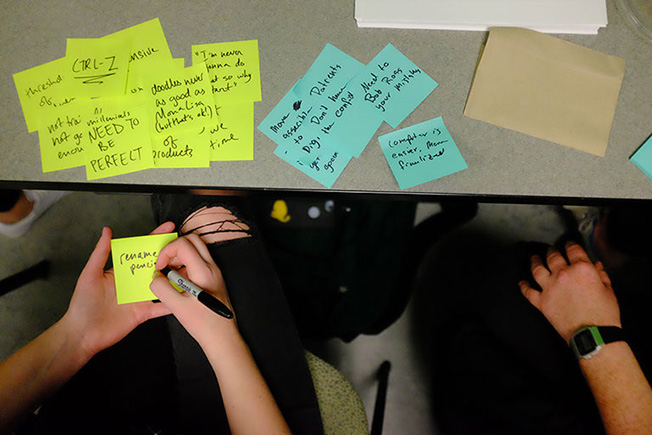The Master's Degree Program in Communication from Michigan State University has two major directions, the thesis option (pre-Ph.D. track) and the final examination option (career-oriented track). For either option, you can select a focus area in communication as an emphasis, such as interpersonal communication, organizational communication, mediated communication, persuasion and social influence, political communication or intercultural communication.
Master of Arts in Communication

Degree Details
Information regarding the M.A. Communication degree
Required Courses
The minimal required courses allow you maximum flexibility to design your own curriculum in consultation with your faculty advisor. You may choose from courses inside and outside of communication to obtain the necessary 30 credit hours to graduate.
All students take two required courses: Communication Theory and Introduction to Quantitative Research Methods. Additionally, pre-Ph.D. track students take an applied statistics course and master’s thesis credit hours.
Choose Your Track
Both tracks in the M.A. Communication program are designed to assist you in improving your ability to:
- Identify key communication variables affecting a person's performance, either in an organization where you have worked or one in which you expect to work after completing this program.
- Develop communication strategies for coping with specific communication problems, which may exist in your current or future job.
- Identify communication variables, which influence the relationship between your organization and the larger community.
- Demonstrate an ability to apply information from coursework to the development of communication strategies.
- Synthesize results from research on any question.
Pre-Ph.D.
The pre-Ph.D. track is designed to prepare you to compete for entry into a Ph.D. program in Communication.
Career Oriented
The career oriented M.A. track is better suited for you (a) if you would like to improve your ability to communicate and/or (b) if your ability to develop and implement appropriate communication strategies is critical to your professional performance.
Students in both tracks learn quantitative research methods to approach their understanding of communication as social-scientific scholars.
Specialize in a Topic that Interests You
Specialization in Nonprofit Fundraising

Set yourself apart and gain an understanding of fundraising strategies, the role of fundraising within nonprofit organizations, the role and responsibilities of the fundraising process, assist in fundraising activities and more.
Our Alumni
See what alumni have said
Alumni of the program work in a variety of industries, including government, nonprofit and for-profit companies. Many students in the career-oriented M.A. Communication track have an interest in philanthropy and nonprofit work. These students may add to their degree a specialization in nonprofit fundraising, which requires a practicum experience in a nonprofit organization.
Quotes from our Alumni:
“I loved being surrounded at every turn by professors and students who were doing big things in the field.” - Chelsea Fristoe, M.A., 2010
“I really enjoy how relatable the faculty members are. They are mentors and encouragers.” - Katie Murray, M.A., 2015
“Rigor. I appreciated how much was expected of us.” - Dr. Hillary Shulman, M.A., 2007
“I wanted to have more of a communication background, which has been extremely helpful to me in running nonprofits.” - Jamie Schriner, 2006
“I learned so much more because of the smaller classes and more intimate setting.” - Justin Howe, M.A., 2012
Questions?
Additional information about the Master of Arts program in Communication may be obtained from:

Rachel Iseler
Academic Programs Manager
rachel@msu.edu
472 ComArtSci Building
404 Wilson Rd.
East Lansing, MI 48824